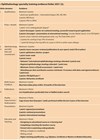Not long after securing my fellowship in London I was successful at interview for a consultant post at Singleton Hospital, Swansea. The interview took place before I had actually started in London and besides the basic things that are asked in consultant interviews I had one thing weighing heavily on my mind. I knew Swansea would ask me to cut short my fellowship and I knew I had to politely refuse to do so.
This is the battle that every would-be consultant is faced with and myriad factors come into play to determine how the scenario plays out. How much do they want you, how many people are you up against, how well do you know the team and in reality how long can the interviewing hospital wait? By a stroke of luck a good friend of mine who had also been shortlisted and who made no bones of the fact that he would drop his fellowship in an instant were he to be offered the job, had been appointed elsewhere. Otherwise there were too many unknowns.
I used to watch Deal or No Deal with Noel Edmunds. Well, I watched a few episodes in the beginning. Well, okay, I watched one episode by accident while visiting my grandfather who never switches his television off lest the universe end, and I found myself thinking the interview was somewhat similar. How much was I prepared to push the fellowship? Could I hold out for a full year? Would I be able to negotiate nine months? How much would I actually be prepared to sacrifice and where was the point that I would refuse and have to give up my dream job in my home city of Swansea?
I discussed this with colleagues and the consensus was that this was a once in a lifetime opportunity to obtain knowledge. So, with no sleep and a burning peptic ulcer, I reached the point in the interview where I knew I would be asked the inevitable question and with dry mouth and sweating forehead, for the heating in traditional NHS style was wedged on in summertime, I stated my case. After an hour of agonising wait on a wooden bench outside the room making small talk with the other candidates, while secretly working out if my odds of securing the position would improve or decline should I batter them to death with the nearby hat stand, I was called in. In fact two of us were, as funding had been found for two posts. There would be no need for murder and mercifully I didn’t need an emergency laparotomy that evening for a burst ulcer, although I had convinced myself it was a close run thing. I had lost a few weeks of the fellowship only, a few weeks that were symbolic of compromise more than anything, and I was still left with 11 months.
I was grateful a thousand times over for those 11 months. I had the chance to see and manage cases in clinic while all the time having a protective consultant above me assuming all responsibility. It was a golden age. I learnt medicine and more importantly, how consultants manage their clinics. Knowledge was one thing, everyone at the Big House had that in spades, but running a clinic was an entirely different beast. Some bosses would micromanage and looked as if they would drive themselves into an early grave through assumed collective worry at all the decisions being made in their name throughout the clinic. Others would assume the laid back look and let the clinic run itself, although the tendency would be for it to finish at 3:30am if this approach was followed too rigorously. Still others would attempt to make the clinic run faster and more efficiently through distributing notes and making their presence known. This approach seemed to be the best as the fellows were empowered and a certain moral justice took place as those who were slow or had a tendency to quietly slink away were unable to do so. This was probably the most valuable thing I learnt as never again would I be so free of responsibility and so easily able to see bigger and better clinicians deal with complex problems.
I made good connections too and I like to think that some of those were friendships that will endure beyond the end of my time in London and will provide me with a nice safety net should I run into difficulty. Perhaps one day I will have the honour of having my pictures, sent from Swansea, discussed by Pearse Keane in the presence of the Holy God of medical retina, Alan Bird, at his weekly teaching session. Perhaps the Great One will not laugh at the simple inability of a provincial Welshman to diagnose an easy problem. During my last few weeks I was touched when Professor Bird took me to one side to wish me well and even remembered my name. He then proceeded to tell a lengthy joke about consanguineous marriages within rural Welsh communities, to which I like to think I laughed appropriately although inwardly I wasn’t too sure what I should have been doing under those circumstances.
The highlight was the kind consultants and fellows whom I had many farewell dinners and drinks with. Those high priests of medical retina whom I had seen lecture at Euretina and at Congress were in reality such friendly people that sometimes I would remember who they really were and my Imposter Syndrome would return with a vengeance. My friends, the other fellows, would one day be great themselves and I will miss each one. The ritual of leaving was as important as the arriving and with a heavy heart I packed my belongings and took the train back to Swansea to start my new job. I guess the poignancy of this was reduced somewhat by the fact that I took the train back to London a few weeks later for a course and met many of my friends again.
So, as I get inducted at Singleton, get my name badge printed and register with the library, I wander past the room where I was interviewed a full year previously and rest my eyes on the wooden bench where I could so easily have died from stress. With effort I could make out the image of the stressed Gwyn gently rocking back and forth while attempting to reduce gastric acid production. Were he able to sense my future presence I would have thanked him for insisting on the full fellowship, and to anybody reading this who finds themselves in a similar dilemma I say that the loss of gastric epithelium is worth it. Stick to your guns and take some form of proton pump inhibitor or anxiolytic. If that doesn’t work you can always consider murdering your fellow interviewees with a hat stand.
The views expressed are those of the author and do not represent those of the editorial team or the publisher.
COMMENTS ARE WELCOME










